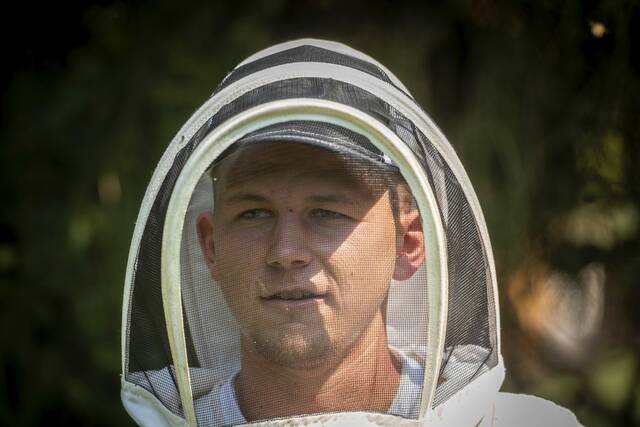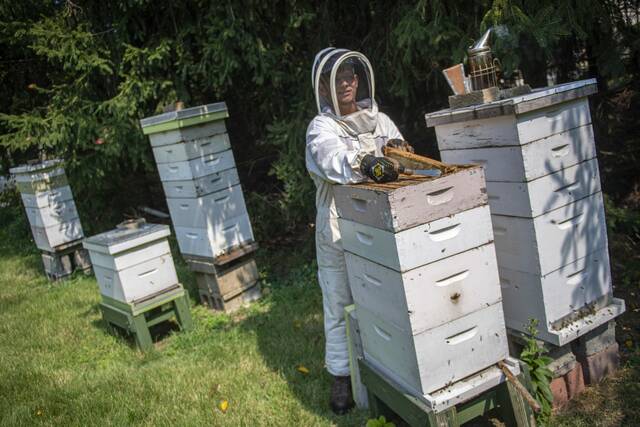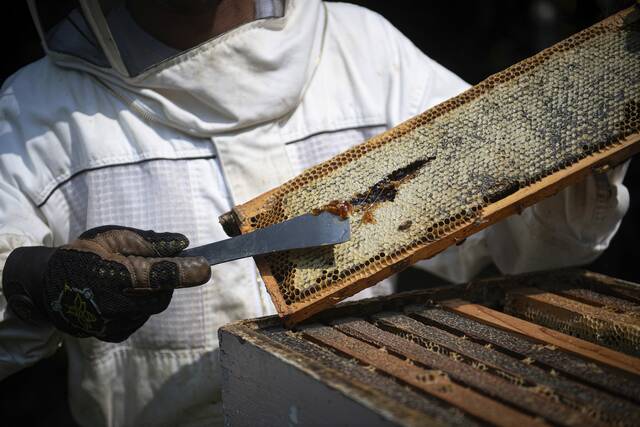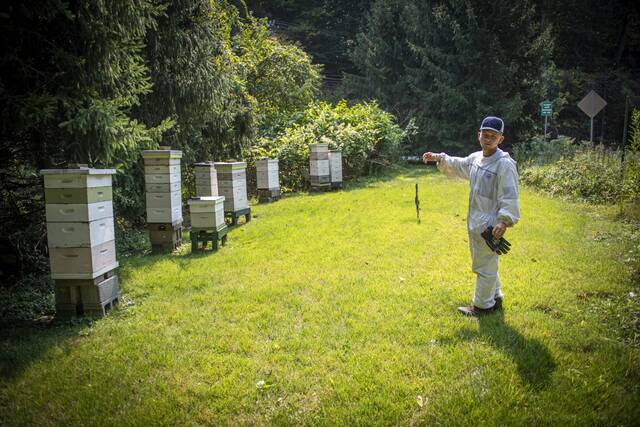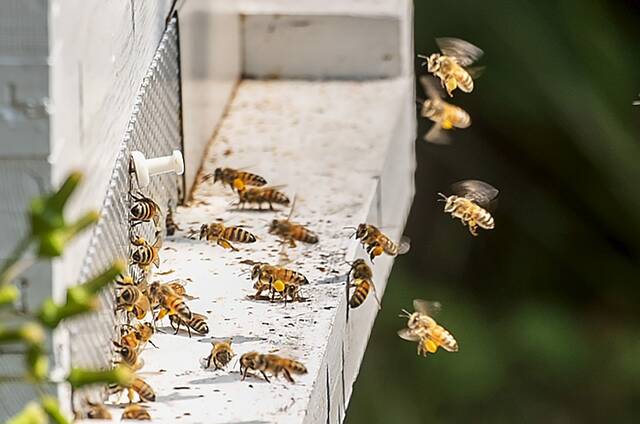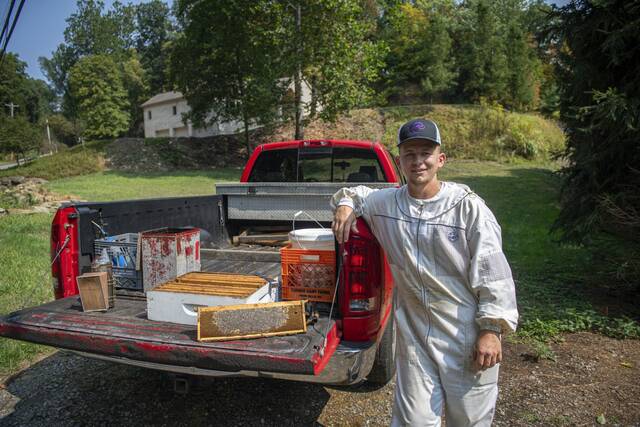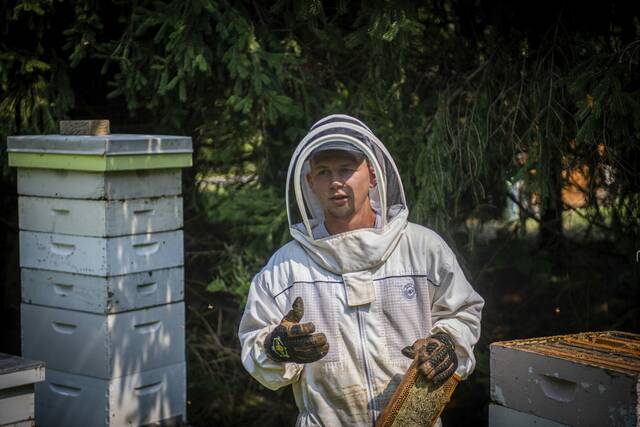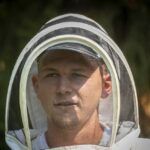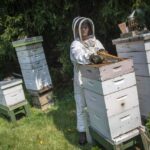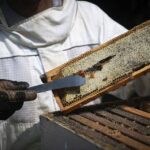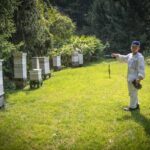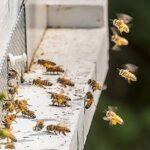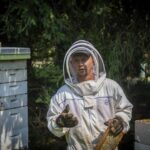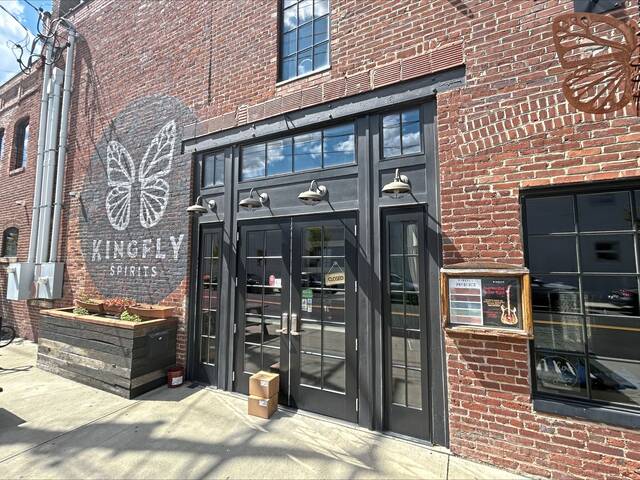Anthony Ondo’s love of beekeeping started as a good deed that soon became love at first sting.
Now a junior at Chatham University’s Falk School of Sustainability studying sustainable business, the 22-year-old Shaler resident applies what he learns in his classes directly to his apiary business while using his profits from selling honey to pay a portion of his tuition.
It started in 2021 when, just before graduating from Shaler Area High School, Ondo’s friend, Nate Owczarzak, asked Ondo to help his beekeeping grandfather, Tom Owczarzak of Blawnox. Being in his 80s, Owczarzak needed help lifting the heavy hive boxes and harvesting the honey.
Ondo said he was nervous at first because of his father’s bee allergy, but, after being stung in the first couple of minutes, his fear gave way to admiration.
“Through that initial fear/excitement, the connection with nature, the admiration of something — an insect so small — with the hive mentality, it relates back a lot to us as humans, and how we can conserve and steward the land we’re living in,” Ondo said. “I just fell in love with it. I’ve never done anything in my life where, the first time I did it, I just knew I wanted to be involved with it.”
Owczarzak helped him start out by giving him two hives. Over time, Ondo reinvested the money he made from selling honey to buy more hives. Today, Ondo manages his own 50-hive apiary, runs his own business, Ondo Apiary LLC, is the resident beekeeper at Dillner Family Farms in West Deer and is the student manager of Chatham’s apiary program at Eden Hall Farm in Richland.
Though Owczarzak has mentored new beekeepers before, he said Ondo came into his life at the right time and with the right drive.
“I saw a young person that had an interest in something that I was interested in, and we took off from there. I helped him get his first hives, and he’s helped me. And it was a time in my life when I was cutting back, so the two work together,” Owczarzak said. “Anthony had more ambition in the beekeeping business than the others.”
Ondo already has assumed responsibility for some of Owczarzak’s hives and plans on taking over the remainder once Owczarzak fully retires from beekeeping. In the meantime, Owczarzak continues to help Ondo with hive maintenance about two days a week.
Ondo sells his honey to friends and family, Dillner Family Farms, SD Polish Deli in the Strip District and at the Shaler North Hills Library.
Before he discovered his love for beekeeping, Ondo had been interested in business for a while. He already had some business experience by doing “little side projects” such as lawn cutting, landscaping and fixing old equipment. Once Ondo began beekeeping, his affinity for entrepreneurship, along with Owczarzak’s guidance and support, had him scaling his business quickly.
After one of Owczarzak’s beekeeping friends, Shaler resident Jim Stein, passed away in 2023, Owczarzak told Ondo to approach the family. Ondo purchased 20 of Stein’s hives as well as “all of his equipment.”
“That kind of jump-started me from hobbyist selling to friends and family to, ‘Holy cow, I gotta get some clients,’ ” Ondo said.
That’s when he partnered with Dillner Family Farms to become its beekeeper — keeping some of his hives on the property and selling his honey to the Dillners, while his bees help pollinate on the farm year-round.
“They align with my beliefs of the sustainable farming. They’re into a lot of integrated pest management practices up there, and that’s a lot of what I’m studying in the sustainable business program,” Ondo said.
Ondo said pest management is one of the biggest differences between commercial beekeeping and his own sustainable method. Some pesticides and other products can be used in a hive to keep hive beetles, mites and other pests out, but those products often have to be used after the honey supers — the parts of the hive box that hold the honey — are removed.
“If I don’t want the treatment in there for honey that I’m gonna be eating and that I’m gonna be selling, why would I want it in there for my bees?” Ondo said. “I look at it from a sustainable side of, what can I do that’s safe, but what can I do that also is going to be effective in protecting them the best that I can?”
Ondo said while some commercial beekeepers might keep it simple by giving all of their hives the same treatments whether they need it or not, Ondo evaluates each hive individually, even if they’re right next to each other.
“It’s always something different. Just because they’re all in the same yard doesn’t mean they’re facing the same problem,” Ondo said. “One could have a little bit heavier of a mite count. So I might have to treat that one, whereas the one right next to it might not at all. So each one is its own little case study, basically. And I like the puzzle of that.”
Another difference between commercial beekeeping and Ondo’s sustainable approach is his careful decisions about how many hives to put in each yard.
“I never like to overdo hives in a specific area. I don’t want to compete with the feral colonies that are in the trees, in the woods. Maybe there’s other local beekeepers that have one or two,” Ondo said. “I don’t want to have just my bees kind of taking over the entire area. So I always try and look at maps of the woods, flora maps, watershed maps.”
Ondo keeps hives in various yards in the Pittsburgh area, including a yard on White Tail Lane in Shaler in which he maintains eight hives.
“So many people drive through here. I have the fewest hives in this yard out of all my other yards, and it takes me the longest to work here because so many people are stopping, asking me questions. And I love it, because a lot of my other yards are kind of tucked away,” Ondo said. “I get people that pull right in this spot here all the time, and it’ll be a 25- to 30-minute conversation — showing kids, letting people taste honey right out of the frame. It’s a great thing.”
At Chatham, Ondo is paid to oversee hive management and student engagement activities. He helps other students — some of whom have little to no beekeeping experience — learn and practice hive management and integrated pest management, passing on the knowledge that Owczarzak passed on to him.
“We get to do a ton of fun workshops and stuff for the other students that aren’t necessarily in the apiary job area,” Ondo said. “A ton of workshops — bee related, honey tastings, all that fun stuff.”
Ondo sells two main types of honey: a spring honey and a fall honey. The spring honey is a light gold-colored variety harvested from April to July that Ondo and his mother use in the kitchen for chicken glazes, salad dressings and the like. The fall variety is a darker, reddish-amber honey harvested from August to October that people often use for baking.


